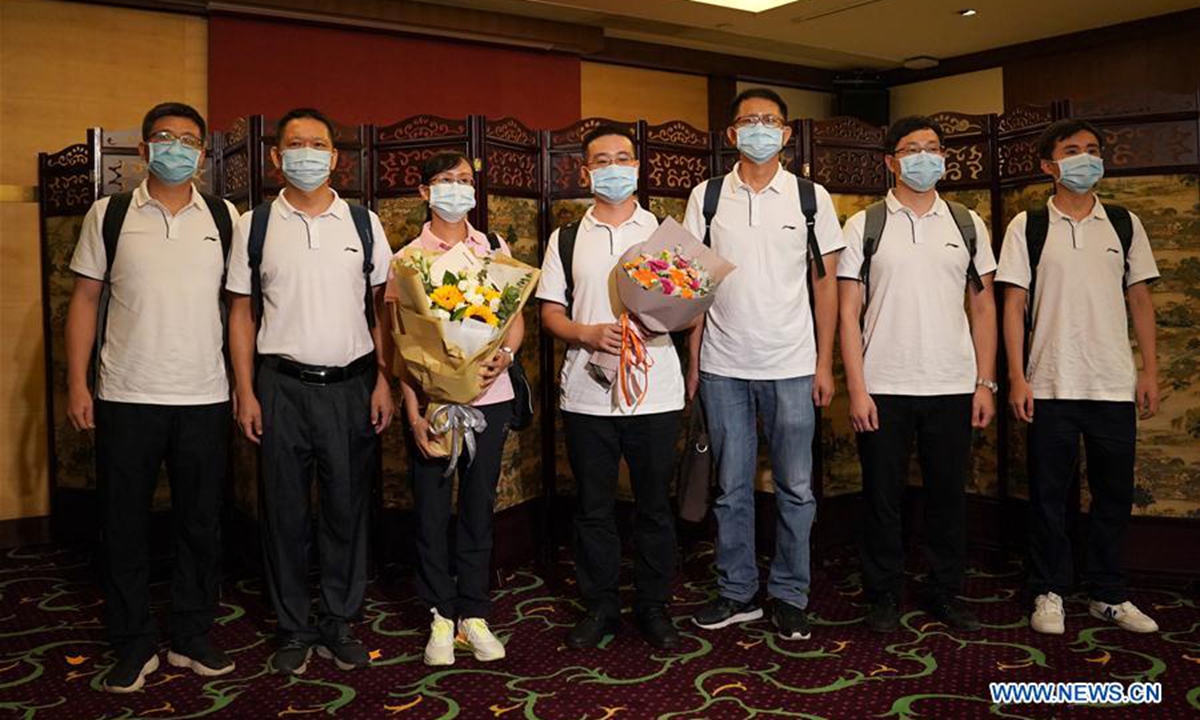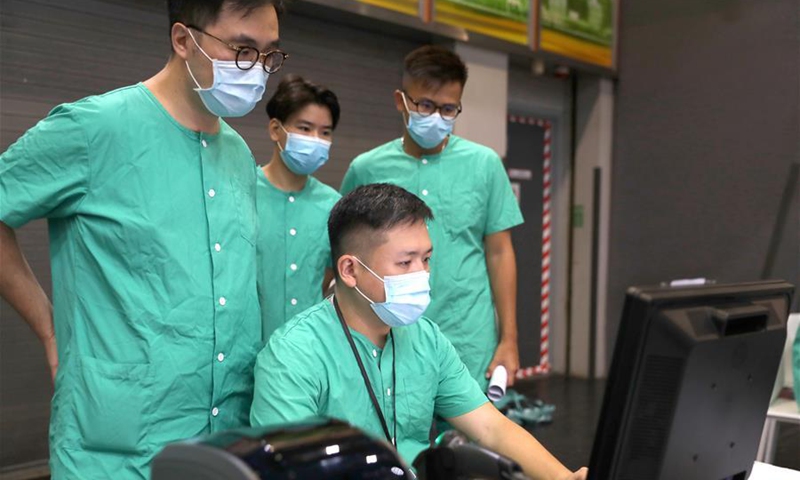Mainland medics to expand HK testing
By Liu Caiyu, Cao Siqi and Zhao Yusha Source: Global Times Published: 2020/8/3 21:48:41
Opposition shows ignorance of mainland’s motives

Virus testing professionals from the Chinese mainland pose for a group photo after their arrival in Hong Kong, south China, Aug. 2, 2020. Seven virus testing professionals from the Chinese mainland arrived in Hong Kong on Sunday afternoon as the first batch of mainland supportive teams to help contain a worsening spread of COVID-19 in Hong Kong. (Xinhua/Li Gang)
A nucleic acid test assistance team dispatched from the mainland to Hong Kong vowed to help expand the city's daily test capacity from less than 10,000 to 200,000, a step epidemiologists said would help plug one of the biggest loopholes in Hong Kong's virus battle.But whether such wider test ability will lead to a city-wide test of its 7.5 million people has sparked a heated debate among local and mainland experts. Those supporting the team said that judging by the example of Wuhan and Dalian, such massive test helps to screen those who should be screened and arrest the contagion in a shorter time; while the opposing side blames the city's insufficient test ability and people's negligence of virus infection, and said a city-wide test should be paired with more stringent lockdown measures, which are not possible in Hong Kong.
Plug the loophole
Yu Dewen, the team leader from neighboring Guangdong Province, told the Xinhua News Agency that the arrival of nucleic acid technicians from the Chinese mainland is likely to boost the daily testing capability to 200,000 from Hong Kong's current 10,000 per day.
Yu said that before engaging in testing, he and his team would talk to the liaison office of the Chinese central government in Hong Kong, the city's bureau of health, food and hospital authority. The team will also discuss the equipment and the work procedure of three mainland testing agencies, including BGI.
Yu said his team is aware of the difference in laws and regulations of Hong Kong and the mainland, saying they will carry out their work in accordance with the local laws.
Wan Jun, deputy head of Renmin Hospital of Wuhan University and also head of the "Fangcang" makeshift hospital in Wuchang district, Wuhan, told that it will bring the experience of Wuhan's Fangcang hospital to help Hong Kong fight the virus.
"Our team is bringing care of the central government and people from the country to Hong Kong," said Wan, noting that under Hong Kong law and regulations, and professional guidance, they will carefully manage every step, including the disposal of medical waste and site design.
Hong Kong reported 80 new confirmed COVID-19 cases on Sunday, the first time the number has dropped below 100 in 12 days, local media reported, citing the city's health official. Hong Kong has reported a total of 3,590 confirmed cases.
Hong Kong microbiologist Yuen Kwok-yung told the Global Times that the aid from the mainland makes up for where the SAR government is weak, as Hong Kong has no experience in wide population testing and building temporary hospitals. Hong Kong also needs help from the mainland on hardware, equipment and reagents, Yuen said.
Chung Mau-Lo, Hospital Chief Executive at The University of Hong Kong-Shenzhen Hospital, told the Global Times that Hong Kong's nucleic acid test has three characteristics: small in number, slow and unsatisfactory quality.
It takes Hong Kong two to three days to get the results on average, while only a few hours in the mainland, Lo said. Lo believes a city-wide test, which is helpful to contain the contagion in Hong Kong in theory, may be unrealistic in practice.
"If people do not stay at home during the testing period, they can easily get infected by moving around after testing negative," Yuen explained, adding if a full population testing is to be done, Hong Kong may need a lockdown first.
Lo said that massive nucleic acid test is necessary as it serves as glasses to help us see the invisible virus, under assistance of timely and massive test, patients can be isolated and treated in timely manner. Lo said that central government has very successful and abundant experience in curbing contagion in cities like Wuhan and Beijing, which also endowed it ability to help virus-hit Hong Kong.
He is confident that the arrival of mainland aid team, and help from three mainland testing agencies, will greatly boost the city's test ability.
Lo also pointed out that building makeshift hospital is necessary as Hong Kong used to quarantine patients with mild symptoms at home. "Most Hong Kong residents used to crowd in a very confined space. So once one member is infected, it poses great risk to other family members. And if those members go around in the city, it poses great risk to the city."
The hospital head noted Fangcang hospital will help the city isolate this group of patients, and relieve pressure of strained hospital beds.

Staff members work at a makeshift hospital for COVID-19 patients at the AsiaWorld-Expo in south China's Hong Kong on Aug. 1, 2020. A makeshift hospital at the AsiaWorld-Expo, a venue near the Hong Kong International Airport, began receiving COVID-19 patients with mild symptoms since Saturday afternoon, Hong Kong's Hospital Authority (HA) said. (Xinhua/Wu Xiaochu)
Anti-intellectualism rumorsThe Hong Kong regional government and residents welcomed the arrival of the medical aid team, but the aid team was also put under the political lens by some opposition forces who spread rumors to disrupt the work.
Observers from Hong Kong and the mainland said the rumors reflect anti-intellectualism, which shows they are being stupid and shallow, and putting politics ahead of lives.
Social activist Lester Shum, a Tsuen Wan district councilor, and Joshua Wong, a leading secessionist, made alarmist remarks online, claiming that the central government sent medics to Hong Kong to test and collect the DNA of Hong Kong residents in the name of epidemic prevention. They claimed that the relevant information would be sent to the mainland to establish a comprehensive scientific and technological monitoring system.
Local medical experts harshly criticized them. Cheung Hon Ming, president of the Association of Licentiates of Medical Council of Hong Kong (ALMCHK), a professional medical organization established in 1995 in Hong Kong, refuted the rumors as being vicious and attempting to throw the city into disorder.
"Most residents in Hong Kong are Chinese people. What were these rumors trying to prove? Those people who spread rumors are the black sheep in Hong Kong who obstructed the anti-epidemic work and created trouble for local residents," Cheung told the Global Times on Monday.
Tong Kai Sing, vice president of the association, noted that such a claim is baseless as the purpose of the testing is to identify the coronavirus. The medical staff must not violate the code of ethics when collecting samples, and the use of test samples for other purposes is also not in line with world standards.
Nucleic acid testing is looking for virus genes, while human genes are sequenced and mapped. They are two kinds of analyses with different processes and costs. The genes of ordinary people have no strategic value, Tong told the Global Times on Monday.
The HKSAR government condemned the rumor mongers on Sunday night, clarifying that all testing will only be conducted in Hong Kong, and related samples will not be sent to the mainland for testing.
"All these samples will be destroyed in Hong Kong after accomplishing their tasks," Tong added.
Those rumors also sparked heated discussions on mainland social media platforms. Many netizens on Sina Weibo lashed at the rumormongers for what they describe as "white-eyed wolf" - person who is not grateful. Some urged the team to stop helping the ingrates.
Tong admitted that this is the first time he felt the city was in a panic in his decades practicing medicine. But he stressed that the government and the vast majority of local residents are grateful for the central government's help.
Some Sina Weibo users said they believe most people in Hong Kong love the city and they country. They understand that doubts because of misunderstandings with the mainland.
RELATED ARTICLES: